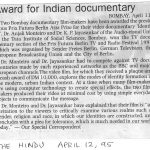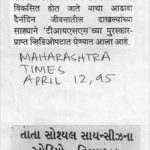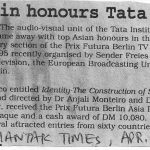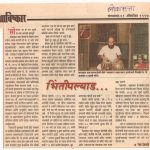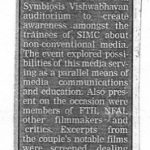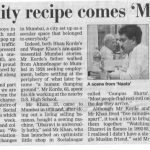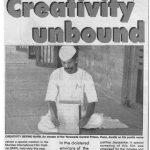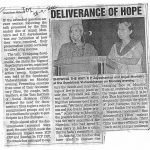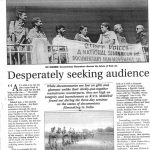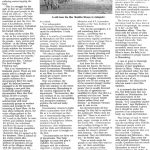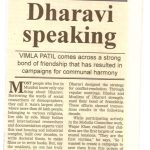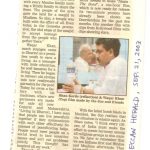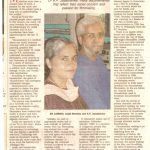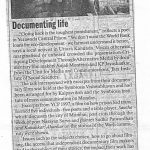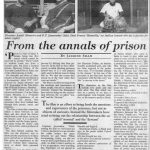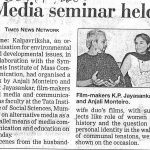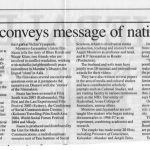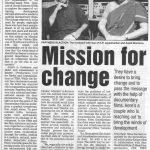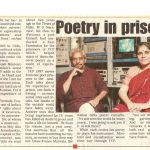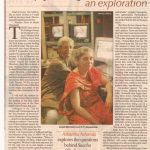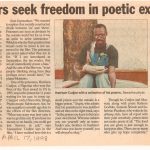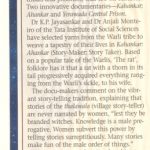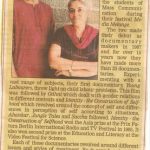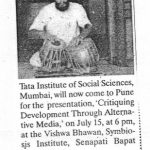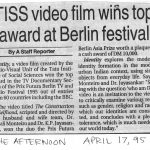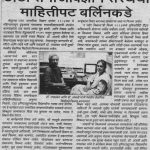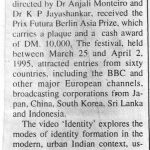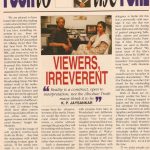Reviews
Documentary Magazine| November 22, 2021
Duty of Care: The Filmmaker-Protagonist Relationship
Inuth | December 2017
Anumeha Saxena reports on SMCS films around Mumbai’s streets.
The Conversation | December 2017
Tisser des fils fragiles : quand des musiciens indiens célèbrent la diversité face à l’intolérance
The Conversation | November 2017
A Delicate Weave: folk singers from Western India celebrate diversity in the face of intolerance
The Scroll | November 2017
In ‘A Delicate Weave’, musicians from Kutch stitch together a message of love and peace
Frontline | April 29, 2016 | Documenting India
Ramesh Chakrapani reviews the book A Fly in the Curry
Senses of Cinema | September, 2015
Film scholars Anne Rutherford and Laleen Jayemanne interview Anjali Monteiro and K.P. Jayasankar on their documentary praxis–Sufi poets, story-telling as performance and non-violence in Indian documentary film.
Senses of Cinema | September, 2015
Daily Pao, Mumbai | August 6, 2015
Daily Pao writes about ‘Giran Mumbai,’ a website revisiting the mill lands of Mumbai and its people created by SMCS.”
Hindustan Times, Mumbai | August 6, 2015
Hindustan Times writes about ‘Giran Mumbai,’ a website revisiting the mill lands of Mumbai and its people created by SMCS.
Mumbai Mirror, Mumbai | July 12, 2015
Mumbai Mirror writes about ‘Giran Mumbai,’ a website revisiting the mill lands of Mumbai and its people created by SMCS.
Indian Express, Mumbai | July 11, 2015
Indian Express writes about ‘Giran Mumbai,’ a website revisiting the mill lands of Mumbai and its people.
The Hindu- Metroplus | June 29 2016 | Films that go beyond the screen
K. Pradeep interviews K.P. Jayasankar and Anjali Monteiro on their new book
The Indian Express | Dec 29, 2014
The Indian Express writes about ‘Remembering 1992.’
Scroll.in | Dec 9, 2014
A Public Service Announcement (PSA) film made by SMCS students is featured for its hard-hitting commentary on women’s safety in public spaces.
SBS, Australia | Nov 14, 2013
Anjali Monteiro and KP Jayasankar are two of India’s most experienced doco makers. They’re presenting 9 titles (including one of their own, “So Heddan, So Hoddan”) that addresses India’s marginal communities.
Indian Link | Oct 2, 2013
When it comes to Indian cinema, hardly anyone mentions or knows about documentaries, the poor cousin of feature films. So it was a rewarding experience to watch three award winning Indian documentaries made by KP Jayasankar and Anjali Monteiro at Parramasala 2013 from October 5-7 at the Riverside Theatre in Parramatta.
FILM INK | Oct 2, 2013
ICE is proudly presenting three documentary screenings in Raffertys, Riverside Theatres, each followed by live Q&A sessions with award-winning Indian filmmakers Anjali Monteiro and K.P. Jayasankar. These critically acclaimed documentaries by Indian filmmakers Anjali Monteiro and K.P. Jayasankar, Professors at the Tata Institute of Social Sciences, Mumbai, take an intimate look at spirituality, sexuality, family and tradition.
ART NEWS PORTAL | Sep 23, 2013
Screening on the closing night of Parramasala, Naata follows two friends working with neighbourhood peace committees in Dharavi, Mumbai, Asia’s largest slum. Through the power of community collaboration and conflict resolution strategies, the film is a testament to the ability of individuals to work together to change the fate of a community.
RealTime Arts | Sep 18, 2013
The prominent Indian documentary filmmaker pair Anjali Monteiro and KP Jayasankar, acclaimed around the world for their films about marginalised peoples, are guests of ICE and Parramasala, showing one of their best known films, Naata (2003), and a recent one, Like Here Like There (So Heddan So Hoddan; 2011).
Indian Express | Jul 7, 2013
Selected excerpts from Anjali Monteiro and KP Jayasankar’s work Saacha (The Loom, 2001) looks at Dalit poet Narayan Surve’s poetry as an alternative voice of political representation
The Hindu | Jul 5, 2013
Anjali Monteiro and K.P. Jayasankar’s work also falls in line. The excerpts taken from the duo’s documentary film “Saacha” (The Loom), highlights the poetry of the critically acclaimed Dalit poet Narayan Surve, as he recounts personal memories of the city of Mumbai, the birth place of the Indian textile industry and the industrial working class.
Web Wire | Jun 17, 2013
Poetry and song play an integral role in this exhibition and are explored through the work of four documentary and experimental filmmakers.
Madurai Messenger | Feb, 2013
Using poetry for their documentaries seems to be their favorite mode of storytelling. I was not very surprised when K.P. Jayasankar revealed with amusement that he wanted to be a painter when he was a teenager. His ability to visualize emotions is obvious throughout the fifty-five minute SheWrite.
in.com | Dec 18, 2012
Twenty years after the riots that shook the ‘Maximum City’ to its core, he has made a film on the aftermath of the riots called ‘Aakhri Panah – The Last Refuge’ with three other classmates – which has become their own way of remembering the event.
The Hindu | Dec 12, 2012
As teachers of Tata Institute of Social Sciences, Anjali and Jayasankar work with many young people. At present, they are working on a documentary on Farooq Mapkar, a bank peon, who is singlehandedly fighting the case against police firing in Masjid during the 1992-93 Bombay communal riots.
TOI | Dec 8, 2012
There is a huge gap between documentary films and its audience, says Anjali Monteiro, professor and dean, School of Media and Cultural Studies, Tata Institute of Social Sciences, Mumbai.
DNA | Feb 12, 2012
Through the documentary, the filmmaker duo want to explore the paradox in the lives of the community. The Fakirani Jatts are somewhere in the middle of their glorious past and a present they are coming to terms with. But there is a marginalisation of their tradition, which is apparent everywhere.
Time Out | Sept 14, 2012
The first few minutes of Breakin’ Mumbai are filled with swagger, an attribute easily associated with b-boying or breaking. Fort Minor’s “Remember the Name” plays in the background as acrobatic moves from the dance are juxtaposed with the song’s attitude-laden lyrics, “Yeah, for those of you that want to know what we’re all about. It’s like this y’all. C’mon.
Mid-Day | Jun 17, 2012
The documentary, called Breakin’ Mumbai, won the best film award of the year and was screened at the Clapstick International Student Film Festival at SRFTI Kolkata last week.
The Hindu | Aug 25, 2011
For the duo who have won 22 national and international awards for their films, an integration of their academic and filmmaking energies translate into meaningful journeys as documentary filmmakers, researchers on media consumption, marketing and audience responses, as well.
The Hindu | Dec 8, 2010
Making one film and moving on to the next is not what they do. Whether documentaries have the power to move people, demand change, inspire and educate is still debatable. But Jayasankar and Anjali believe in going back to the people, the places they film, and stay connected with them.
Tehelka | Mar 20, 2010
“WILL THIS film benefit us, you think?” Mura Lala Fafal asks his brother. “The world will see how little we have and how we embrace our life,” he answers, “if they understand”. KP Jayasankar and Anjali Monteiro’s Two Day Fair is a chronicle of two days in the lives of Mura and his nephew Kanji — musicians, wage labourers and farmers of the Dalit community of Meghwals living along the Indo-Pak border in the Rann of Kutch.
Outlook | Dec 4, 2009
In Our Family, a moving documentary by Anjali Monteiro and K.P. Jayasankar, we get a glimpse in the life of a family of three generations of transgendered female subjects, who have connected themselves to each other through adoption. Aasha, the grandmother, lives in Chennai. Seetha, the daughter, lives with her male partner in Coimbatore. Dhana, Seetha’s adopted daughter, divides her time between her adopted and her birth families. The film, while tremendously optimistic, also narrates the difficulties faced by all protagonists within their homes and lives. It would help to see more of these complex stories in the popular media.
The Hindu | Oct 7, 2002
MAKING A documentary involves more than a creative bent of mind. A passion for the cause and intensity of the subject goes a long way in authenticating the project.

